Last updated on 2025-09-07
A review and Photo example of the Apo Summicron SL 35mm with a LEICA T typ701.
- Please see the disclaimer regarding advertising here.
- Italicized links in the text are advertisement links that take you to other sites.
Table of contents
Gallery
The photo examples were taken with the LEICA T typ701.
Review

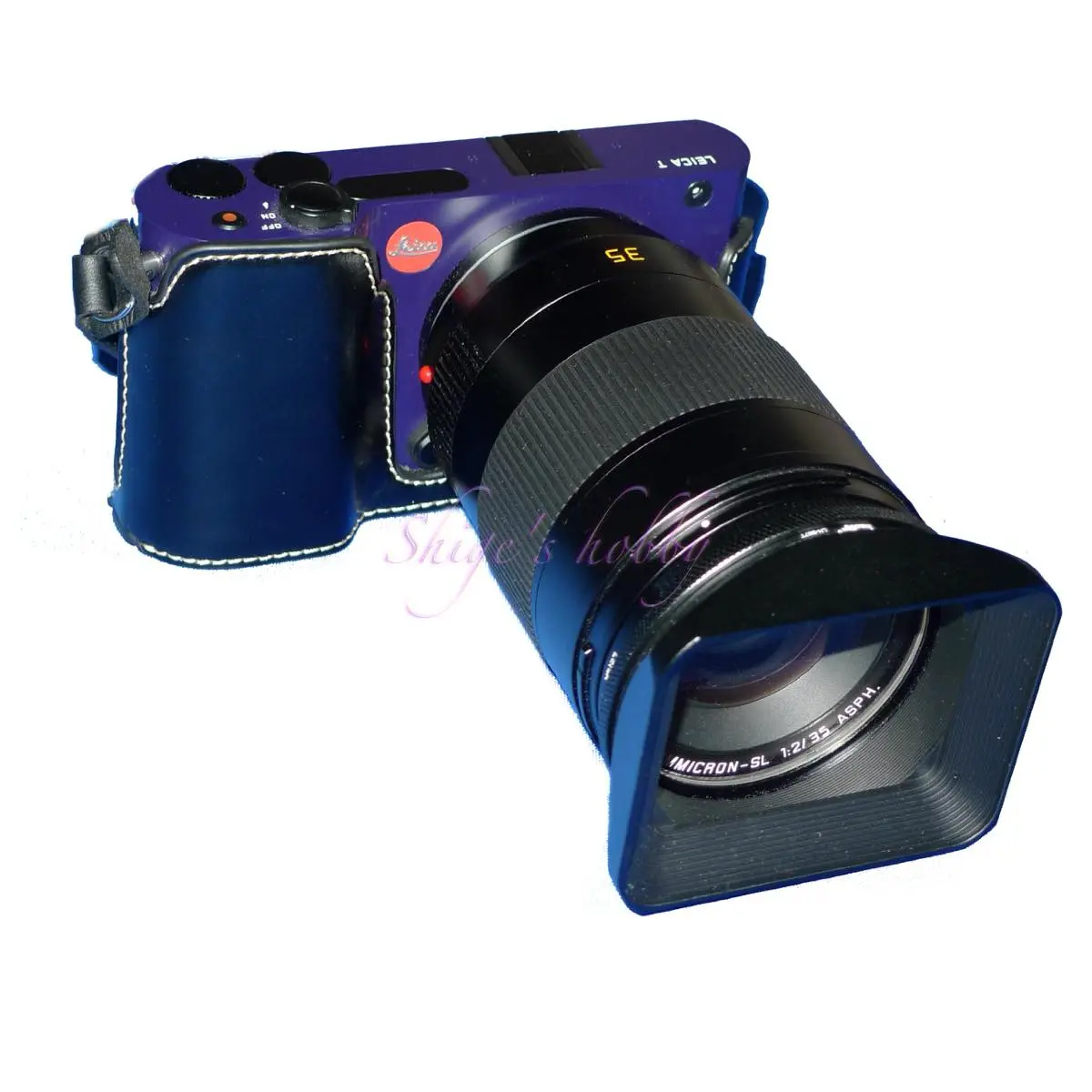
1.Overview
The APO-Summicron-SL 35mm is an L-mount prime lens released in April 2019.
This lens is large, and although it is being compared to the Summilux TL 35mm for APS-C sensor cameras, it is clear that the APO-Summicron is thicker and longer.
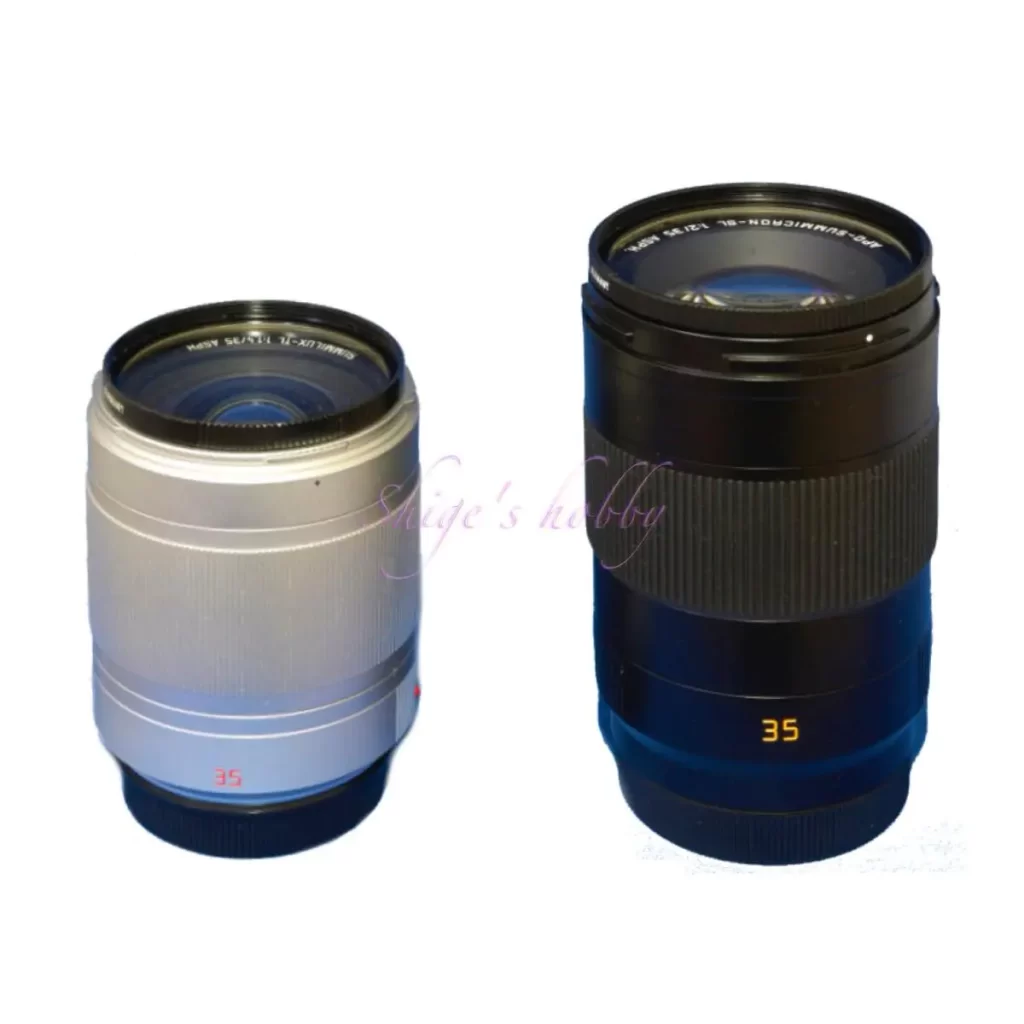
The Apo-Summicron SL series is based on a policy of having all lenses in the same barrel size, and the barrel size is based on the Apo-Summicron 90mm or 21mm, which are the most important dimensions for lens design. For this reason, the 35mm and 50mm are oversized to match them. Thanks to this, the lens design has a high degree of freedom, which can be said to have made it possible to achieve high performance.
It feels better than making useless excuses that the person in charge clearly stated that costs were reduced by standardizing parts, but it is a bit stingy for a lens that sells for more than five times the price of other companies’ lenses with the same specifications. The logic of the company is to build a lens line cheaply and sell well, but as a user who purchases it, I would like the manufacturer to give it a design that is appropriate for the lens specifications. Since I have switched to digital medium format, I do not continue to purchase SL lenses, but I sometimes think it would be nice to have all the types so that I can use them depending on my mood on the day.
As for the actual lens size needed, the Summicron-SL 35mm, which was released in March 2023 without the apo, has a total length that is about 20mm shorter, so this size should be sufficient.
2.Usability
The Apo-Summicron SL 35mm was the only 35mm lens with an Apo-Summicron focal length until the M-mount Apo-Summicron with a focal length of 35mm was released.
I bought the lens second-hand at a map shop for a reasonable price, but I didn’t have much time to use it because I had just sold my LEICA SL typ601. I used it on my LEICA T, and it made me feel that the resolution and depiction of a lens larger than the SUMMILUX TL was superior.
It fully meets the standards required for modern lenses, such as bokeh in front and behind, no loss of contrast in backlight, and no ghosting, and is a lens that is satisfactory even when used with the LEICA SL2 with over 40 megapixels.
The lens hood attached to the lens attached to the LEICA T was the Haoge 67mm Square Screw-in Lens Hood1. I used this one because the included hood was too large and inconvenient to carry around. The position of this hood can be adjusted after it is screwed in, making it convenient for lenses whose barrel does not rotate when focusing.
3.Summary
To sum up the APO SUMMICRON SL 35mm, the image quality and autofocus performance are satisfactory, but the lens barrel is large and heavy.
I would like to think that the size of this SL lens is to improve lens performance, such as the autofocus mechanism, ensuring peripheral light, and improving telecentricity. However, it is also true that the size is hard to accept when you consider the size of the Leica M-mount APO SUMMICRON 35mm.
As expected, this lens is good for photographers who can tolerate this size, but it is not suitable for photographers looking for a compact system.
Competitive Lens
The non-Apochromat Summicron, which will be released in 2023, is half the price and half the weight of the one with the appointment, making it possible to put together a lightweight system. It is estimated that you will not notice the difference unless you are in a situation where color bleeding is a major concern.
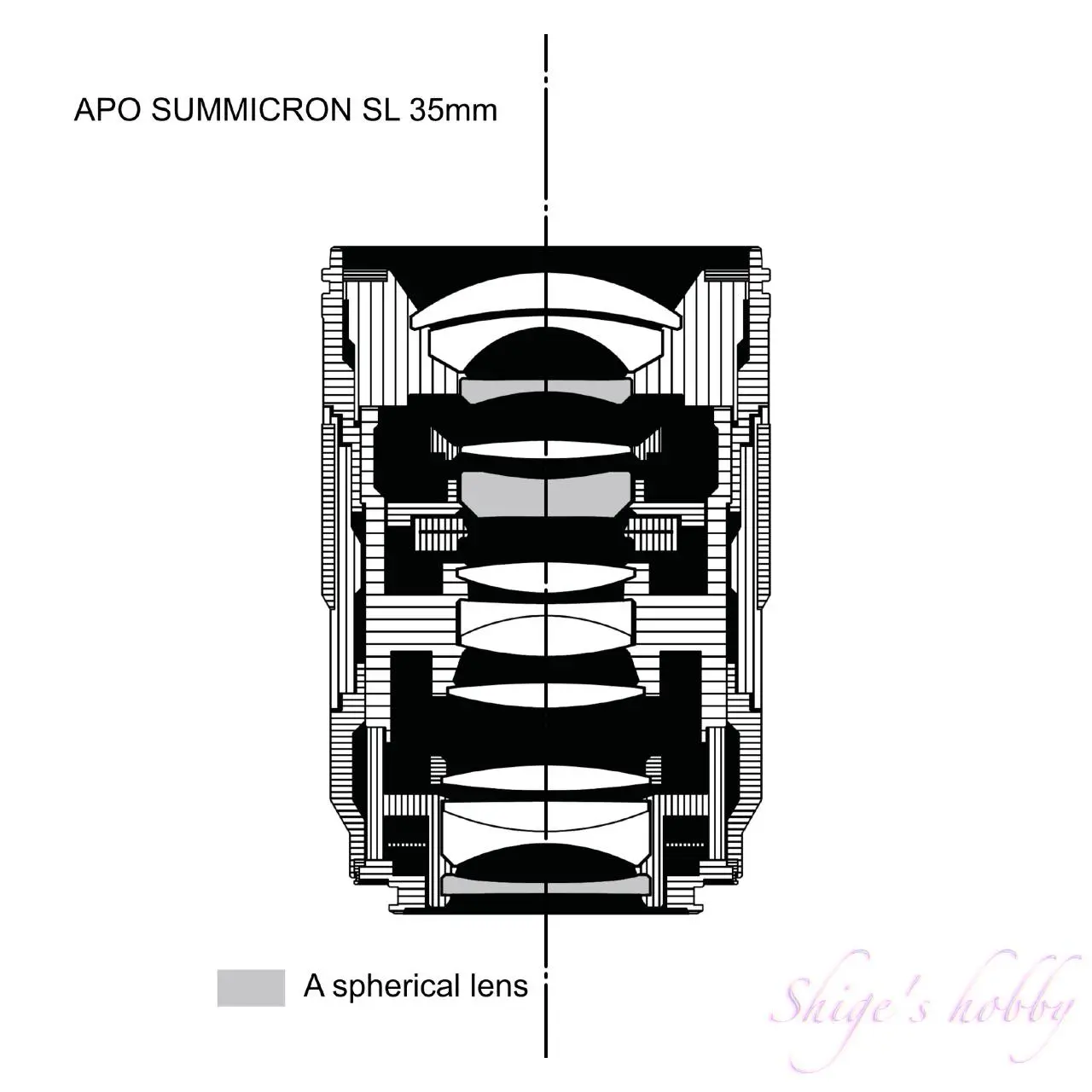
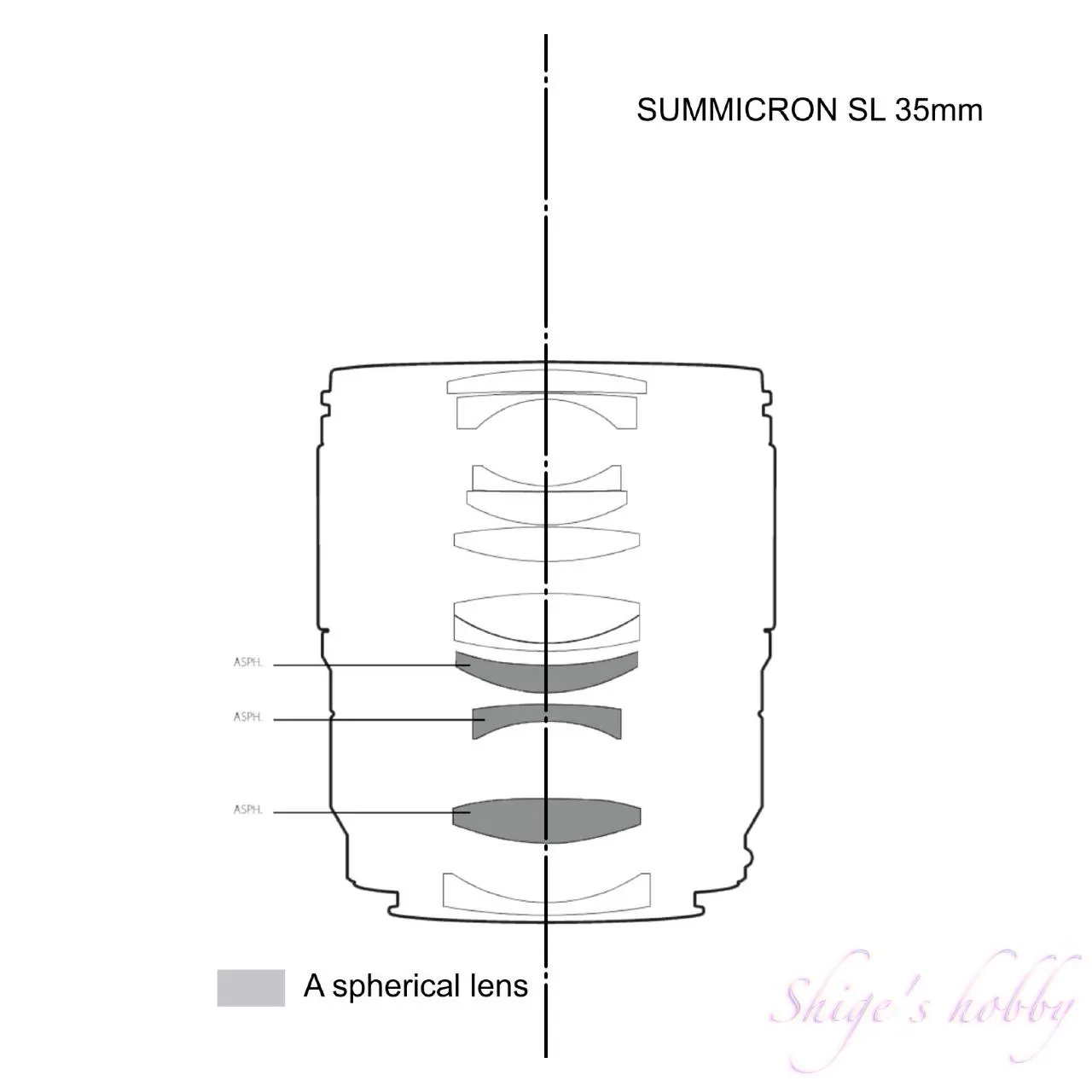
Looking at the lens configuration diagram, the Summicron without APO is almost the same as the LUMIX S 35mm F1.8, so the exterior is Leica designed and is thought to be an OEM for Panasonic. In addition, the lens barrel of the Summicron without APO does not have a country of manufacture stamped on it, but is stamped LEICA CAMERA WETZLAR.
The M-type APO Summicron 35mm, released on April 24, 2021, is surprising in its compact size. I don’t know if it’s because of this, but the price is about 1.3 million yen including 10% consumption tax, more than twice the price of the L-mount, making it quite a high price.
The APO Summicron SL has been on the market for a while now, and the used price has settled down to about 400,000 yen, so if you can overlook the lens size, you can get a high-performance lens at a low price and it seems like a good deal.
The Leica R-mount Summicron is a fairly simple lens with six lenses. Because it is an older design, there is a high chance that roughness will be visible in the depiction of the edges on recent high-pixel cameras, but depending on the subject, there are scenes in which roughness is more noticeable than in others, and since the acceptable range varies from photographer to photographer, it is up to the photographer to make their own judgment.
Sigma’s L-mount 35mm F2 DG DN | Contemporary is being offered at an incredible price, and it is difficult to rationalize such a large price difference for the same specifications. It is the same feeling as with a luxury watch.
Specifications: SL series lens
- LEICA SL APO SUMMICRON Wide Lens Variations
| Items | SUPER APO SUMMICRON | APO SUMMICRON | APO SUMMICRON |
| focal length(mm) | 21 (11181) | 28 (11183) | 35 (11184) |
| Maximum aperture | 2 | 2 | 2 |
| Minimum aperture | 22 | 22 | 22 |
| Aperture blade | ? | ? | ? |
| Lens configuration | 14 elements in 11 groups | 13 elements in 10 groups | 13 elements in 11 groups |
| Minimum distance(m) | 0.21 | 0.24 | 0.27 |
| Lens length(mm) | 102 | 102 | 102 |
| Lens max diameter(mm) | 73 | 73 | 73 |
| Filter type | E67(67mm) | E67(67mm) | E67(67mm) |
| Image stabilizer | L | L | L |
| Weight(g) | 789 | 700 | 750 |
| Release date | 2023.11 | 2021.2 | 2019.4 |
| Price | ¥750,000 | ¥660,000 | ¥630,000 |
- LEICA SL APO SUMMICRON Standard and tele Lens Variations
| Items | APO SUMMICRON | APO SUMMICRON | APO SUMMICRON |
| focal length(mm) | 50 (11185) | 75 (11178) | 90 (11179) |
| Maximum aperture | 2 | 2 | 2 |
| Minimum aperture | 22 | 22 | 22 |
| Aperture blade | ? | ? | ? |
| Lens configuration | 12 elements in 10 groups | 11 elements in 9 groups | 11 elements in 9 groups |
| Minimum distance(m) | 0.35 | 0.5 | 0.6 |
| Lens length(mm) | 102 | 102 | 102 |
| Lens max diameter(mm) | 73 | 73 | 73 |
| Filter type | E67(67mm) | E67(67mm) | E67(67mm) |
| Image stabilizer | L | L | L |
| Weight(g) | 740 | 720 | 700 |
| Release date | 2019.8 | 2018.2 | 2018.2 |
| Price | ¥610,000 | ¥580,000 | ¥640,000 |
Reference links
Affiliate links

Amazon Prime Sale
Update history
- 2024.10.10
- 2024.03.06
- 2023.08.16

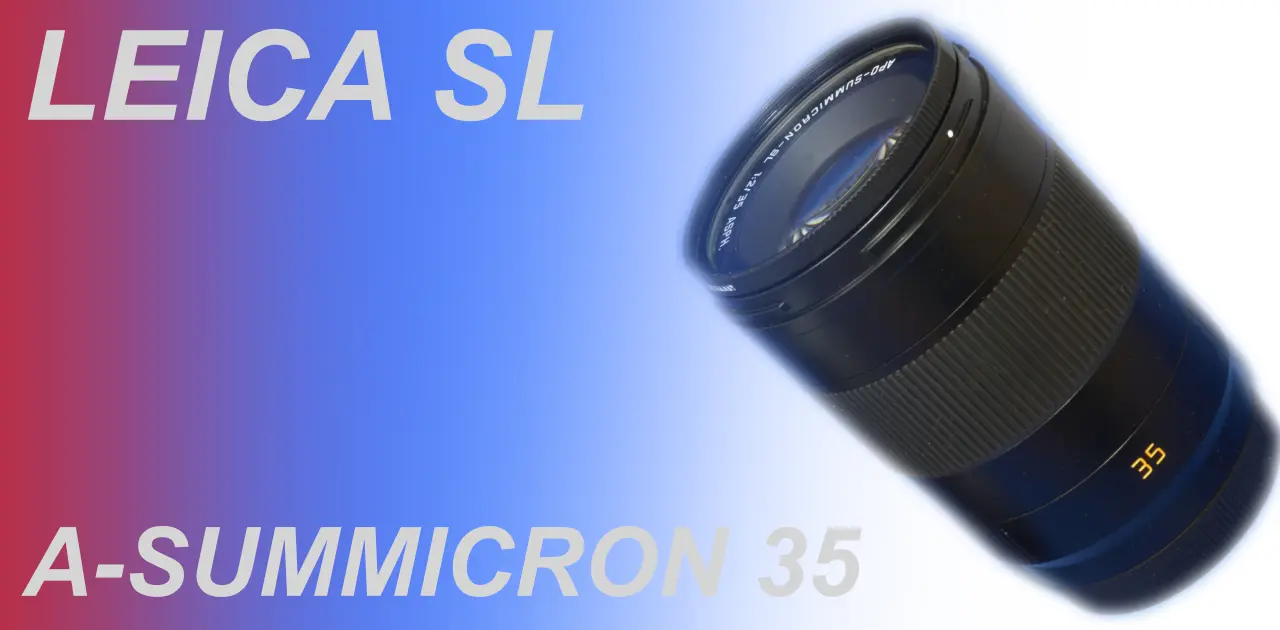

Be First to Comment